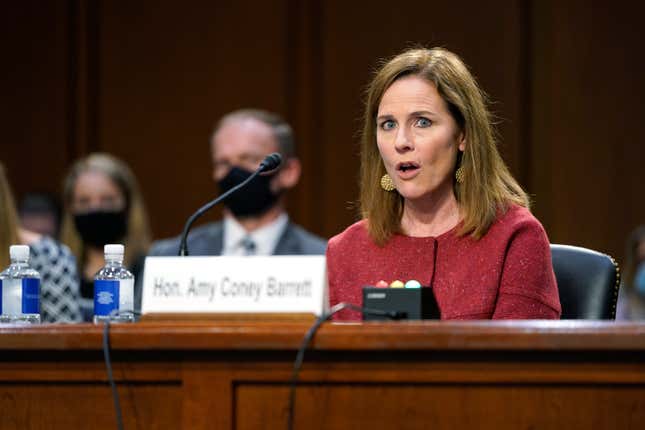
As Senate confirmation hearings for Donald Trump’s Supreme Court candidate Amy Coney Barrett began on Tuesday, her record on big-ticket issues will come under increased scrutiny as people on both sides of the aisle try to discern exactly what kind of Justice she might be. While the confirmation hearings themselves may be revealing—and soundbites may be looped hundreds of thousands of times on cable news channels and social media over the coming days—Barrett’s time spent as an appellate judge offers plenty to parse through. As the Associated Press reports, Barrett has written about 100 opinions in more than three years serving on the 7th U.S. Circuit Court of Appeals. Among these are two cases, one involving voting rights, the other a discrimination suit, that could disproportionately impact Black Americans.
Just last year, Barrett wrote a revealing decision on behalf of a three-judge panel regarding a case about racial discrimination in the workplace, reports the Associated Press. The panel upheld the original ruling, which tossed out a discrimination suit filed by a Black Illinois transportation employee, Terry Smith, who said he was called a racial slur by his supervisor, Lloyd Colbert.
In fact, Barrett reinforced that Smith was to blame for his termination because of his “poor track record.” From AP:
“The n-word is an egregious racial epithet,” Barrett wrote in Smith v. Illinois Department of Transportation. “That said, Smith can’t win simply by proving that the word was uttered. He must also demonstrate that Colbert’s use of this word altered the conditions of his employment and created a hostile or abusive working environment.”
Barrett went on to say that Smith “introduced no evidence that Colbert’s use of the n-word changed his subjective experience of the workplace. To be sure, Smith testified that his time at the Department caused him psychological distress. But that was for reasons that predated his run-in with Colbert and had nothing to do with his race. His tenure at the Department was rocky from the outset because of his poor track record.”
This judgment differs considerably from one given by the most recent addition to the high court, Justice Brett Kavanaugh, who, in a 2013 decision as an appellate judge found that one instance of using the n-word was enough to establish a hostile work environment.
On Tuesday, Barrett told the Senate that she considers herself—like many Republican judicial appointees—an originalist.
“That means that I interpret the Constitution as a law...I understand it to have the meaning that it had at the time people ratified it. That meaning doesn’t change over time and it’s not up to me to update it or infuse my policy views into it,” Barrett explained in a clip that spread quickly on social media.
MSNBC anchor Joy Reid shared a common knee-jerk reaction to the comment, noting that at the time the Constitution was ratified, founders codified the idea that Black people should only count as 3/5ths of a person.
During an election cycle where many fear the possibility of mass voter suppression or a constitutional crisis spurred by a president who refuses to vacate the office, even if he loses, concerns about voting rights have once again leaped to the fore.
Similar to reproductive justice advocates, voting rights activists fear that a 6-3 Supreme Court conservative majority could fundamentally alter the constitutionally protected rights of Americans who have been historically underrepresented and disenfranchised. Challenges to Census results may go before the court, as well as cases involving gerrymandering and new district maps. While SCOTUS ruled against construction election maps on the basis of race, it allowed for local and state officials to redraw maps according to the political preferences of a region. The fear is that these new maps will be so dramatically and purposefully reconstructed that they would allow members of a given party (in this case, Republicans, who are overrepresented in state legislatures) to entrench their electoral advantages for the foreseeable future.
Barrett hasn’t made a ruling on voting rights itself but did impart some of her feelings about it on a decision about gun rights.
From AP:
Barrett dipped into constitutional history to note that states did more to protect the rights of people to own guns than their right to vote. In some states, people who were convicted of crimes lost the right to vote, but not the right to legally have a gun, she wrote.
“And as a right that was exercised for the benefit of the community (like voting and jury service), rather than for the benefit of the individual (like free speech or free exercise), it belonged only to virtuous citizens,” Barrett wrote.
The distinction is telling, suggesting her rationale for why certain rights can be revoked or infringed upon by the state (voting, which requires an element of “virtue” as a citizen), while others (gun rights, free speech) have been—and presumably ought to be more—more stringently protected.
As The Guardian noted in a summary of the hearings, Barrett dodged questions on abortion, healthcare and election laws during the first day of hearings—a frustrating but not unsurprising development. Still, Barrett’s record has said plenty about how she feels about some of these issues already. For those concerned about the rights of Black people in their workplaces or free and fair elections, she has certainly said enough to be worried about.